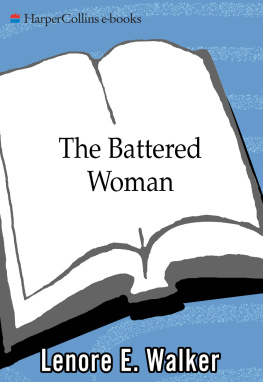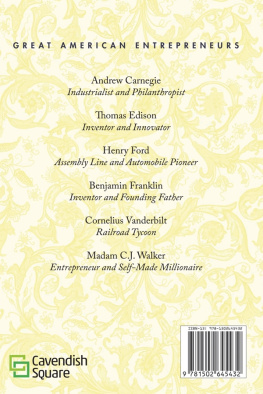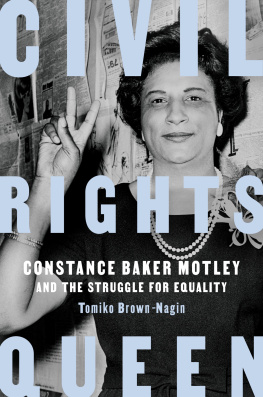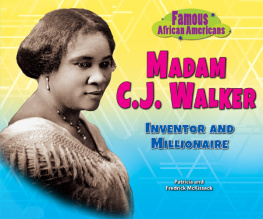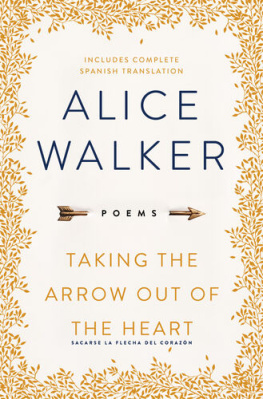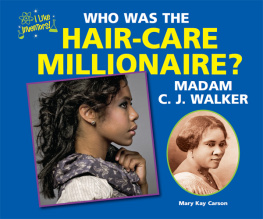T HERESA K AMINSKI HOLDS A P H D IN HISTORY FROM THE U NIVERSITY of Illinois at Urbana-Champaign. For more than twenty-five years she worked as a history professor at a state university, where she taught courses on American womens history, feminism and womens rights, women and war, and historical writing and methodology. She is the author of a trilogy of nonfiction history books on American women in the Philippine Islands during World War II, the most recent of which is Angels of the Underground: The American Women Who Resisted the Japanese in the Philippines in World War II. She is currently completing the first full-length biography of Americas favorite cowgirl, Dale Evans. Theresa lives with her husband in a small town outside of Madison, Wisconsin.
A T TIMESAND FOR VERY LONG STRETCHESWRITING SEEMS LIKE A solitary endeavor, but it is not. I welcome the opportunity to thank those who made this book possible.
Charles Clark, my husband, read the entire manuscript and flagged all the problem areas. I am so grateful for all his support over the years. As a historian, he understands my work, and he knew that my retirement from my university faculty position did not mean I would stop writing books. Sam Clark smoothed out computer glitches and patiently answered technology questions. He and Marta Rusten provided my favorite diversion from too much writing; the world is a sunnier place with Oscar in it. My mother, Irene Kaminski, remains my biggest booster. She never fails to ask when my next book will be published, then tells everyone about it.
The idea for this book came from Stephanie Scott, associate editor at Lyons Press, who believed that Dr. Mary Edwards Walker deserved a fresh look. My agent, Jacqueline Flynn, who always tells me I really can write faster than I think I can, made the deal happen. I could not pass up the opportunity to combine the two topics that have fascinated me since graduate school: war, and womens rights.
I was a history professor for over twenty-five years, and every year I taught undergraduates about the Civil War and the womens rights movement. I read countless books and articles to prepare the best lectures I could, and I had to revisit those publications, plus delve into new ones as I wrote this book. I owe huge intellectual debts to these academic historians and literary scholars whose work laid the foundation for my interpretation of Mary Walker: Sharon Harris, Elizabeth D. Leonard, Lisa Tetrault, and Faye E. Dudden. (A fuller discussion of their works is included in the Note on Sources and Recommended Readings.)
I usually travel to archives to conduct research, but for this project I was fortunate to be able to hire the services of expert researchers. Morgan Kolakowski, a PhD student specializing in nineteenth-century womens history at Syracuse University, navigated the Mary Edwards Walker Papers in the Special Collections Research Center at the Syracuse University Libraries and at the Oswego Town Historical Society. Dr. Kelly ODonnell, historian of gender, activism, and health care in modern America, delved into the Lida Poynter Collection at the Drexel University College of Medicine, Legacy Center: Archives and Special Collections on Women in Medicine and Homeopathy. R. Dennis Pool, professional historical researcher, found Mary Walker items at the National Archives in Washington, DC.
The following archivists and librarians also provided research assistance: Matthew Herbison, archivist at the Drexel University College of Medicine, Legacy Center; Trenton Streck-Havill, assistant archivist at the Defense Health Agency, US Army Garrison-Fort Glen, National Museum of Health and Medicine; and Nicole Westerdahl, reference and access services librarian, Special Collections Research Center at the Syracuse University Libraries.
Many people shared their expertise with me and provided encouragement for the project. Anna J. Clutterbuck-Cook, reference librarian extraordinaire, gave helpful leads on studies of transgender people. The members of the Writing Challenge group on Facebook kept me accountable, day by day, month by month, to reach my publication goal. Our fearless leader, the historian and writer Pamela Toler, and scholars Elizabeth DeWolfe and Sunny Stalter-Pace provided feedback on the project, and Jessica Parr provided an invaluable research contact.
T HIS SECTION IS FOR READERS WHO LIKE TO LEARN HOW WRITERS KNOW what they know but do not necessarily want to read through the Sources section that follows. This is a work of nonfiction; I did not make up anything. All of my information came from primary and secondary sources.
Primary source materialthat which was generated during Mary Walkers lifetimeforms the core of this book. The following collections were instrumental in illuminating her beliefs and actions: the Mary Edwards Walker Papers in the Special Collections Research Center at Syracuse University Libraries; the Lida Poynter Collection on Dr. Mary E. Walker at the Drexel University College of Medicine, Legacy Center: Archives and Special Collections on Women in Medicine and Homeopathy; Military Service Records Relating to Mary Edwards Walker, MD, Record Group 94, Records of the Adjutant Generals Office and Record Group 15, Records of the Veterans Administration, National Archives and Records Administration, Washington, DC; and the Mary Edwards Walker Collection at the Oswego Town Historical Society. I also tracked Dr. Walkers activities in contemporary newspapers, mostly through the databases of Newspapers.com and the New York Times. The Wisconsin Historical Society houses a microfilmed run of The Sibyl: A Review of the Tastes, Errors and Fashions of Society, an invaluable source of Walkers early writings.
Numerous published bookssecondary sourcesprovided additional information, insights, and arguments on Mary Walkers life and times. Of those included in the Sources section, the following warrant special mention because they shaped the way I thought about Walkers world and her place in it. I also highly recommend them to readers who enjoy serious historical nonfiction. Sharon M. Harriss Dr. Mary Walker: An American Radical, 18321919 (Rutgers University Press, 2009) established a timeline of Walkers activities and gave me leads on additional sources. It is the most comprehensive biography of the Medal of Honor winner and provides full discussions of Walkers family and her interest in criminal legal trials. Elizabeth D. Leonard wrote an insightful account of Mary Walkers Civil War years in Yankee Women: Gender Battles in the Civil War (W. W. Norton, 1994), centering on the pervasive sexism the doctor encountered. Leonard includes biographical examinations of other important but little-known women in her book. My understanding of the complexities of the nineteenth-century womens rights movement was greatly expanded by Lisa Tetraults The Myth of Seneca Falls: Memory and the Womens Suffrage Movement, 18481898 (University of North Carolina Press, 2014) and Faye E. Duddens Fighting Chance: The Struggle Over Woman Suffrage and Black Suffrage in Reconstruction America (Oxford University Press, 2011).
Though I did not quote from them for this book, the following will be of interest to those who want to know more about women and the Civil War and the suffrage movement: Karen Abbott, Liar, Temptress, Soldier, Spy: Four Women Undercover in the Civil War (Harper, 2014); Ellen Carol DuBois, Feminism and Suffrage: The Emergence of an Independent Womens Movement in America, 18481869 (Cornell University Press, 1978) and Suffrage: Womens Long Battle for the Vote (Simon & Schuster, 2020); Stephanie McCurry, Womens War: Fighting and Surviving the American Civil War (Belknap Press, 2019); Pamela D. Toler, Heroines of Mercy Street: The Real Nurses of the Civil War


